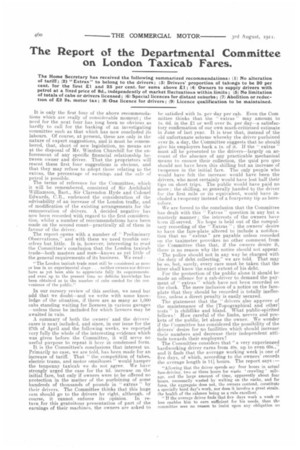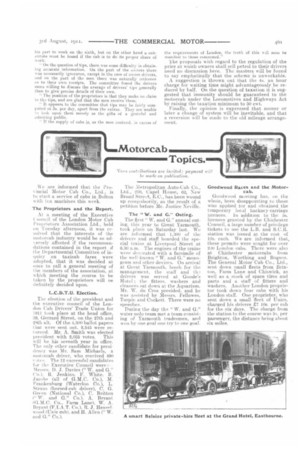The Report of the Departmental Committee on London Taxicab Fares.
Page 6

Page 7

If you've noticed an error in this article please click here to report it so we can fix it.
The Home Secretary has received the following summarized recommendations: (1) No alteration of tariff ; (2) " Extras" to belong to the drivers ; (3) Drivers' proportion of takings to be 20 per cent, for the first El and 25 per cent. for sums above £1; (4) Owners to supply drivers with petrol at a fixed price of 8d., independently of market fluctuations within limits; (5) No limitation of totals of cabs or drivers licensed ; (6) Special licences for distant suburbs; (7) Abolition or reduction of £2 2s. motor tax ; (8) One licence for drivers ; (9) Licence qualification to be maintained.
It is only the first four of the above recommendations which are really of considerable moment.; the need for the next four has tong been so obvious as hardly to call for the backing of an investigating committee such as that which has now concluded its labours. Of course, at present, these are only in the nature of expert suggestions, and it must be remembered, that, short of new legislation, no means are at the disposal of Mr. Winston Churchill for the enforcement of any specific financial relationship between owner and driver. That the proprietors will resent these first four suggestions is obvious, and that they may refuse to adopt those relating to the extras, the percentage of earnings and the sale of petrol is possible.
The terms of reference for the Committee, which it will be remembered, consisted of Sir Archibald Williamson, Bart., Sir Clarendon Hyde and Colonel Edwards, C.B., embraced the consideration of the advisability of an increase of the London traffic, and of modification of the existing arrangements for the remuneration of drivers. A decided negative has now been recorded with regard to the first consideration, whilst a number of recommendations have been made on the second count—practically all of them in favour of the driver.
The report. opens with a number of " Preliminary Observations," and with these we need trouble ourselves but little. It is, however, interesting to read the Committee's conclusion that the London taxicab trade—both masters and men—knows as yet little of the general requirements of its business. We read :
"The London taxicab trade must still be considered as more or less in an experimental stage . . neither owners nor drivers have as yet been able to appreciate fully its requirements. and even up to the present time no definite knowledge has been obtained as to the number of cabs needed for the con• vcnience of the public."
In our cursory review of this section, we need but add that we doubt—and we write with some knowledge of the situation, if there are as many as 1,000 cabs standing waiting for licences in various garages --unless those be included for which licences may be awaited in vain.
A summary of both the owners' and the drivers cases is next included, and since, in our issue for the 27th of April and the, following weeks, we reported very fully the whole of the interesting evidence which was given before the Committee, it will serve no useful purpose to repeat it here in condensed form. It is the Committee's conclusions that interest us. Primarily no case, we are told, has been made for an increase of tariff. That " the competition of tubes, electric trams, and motor omnibuses ' would hamper the tenpenny taxicab we do not agree. We have strongly urged the case for the 2d. increase on the initial fare, but only if owners were to be offered no protection in the matter or the purloining of some hundreds of thousands of pounds in " extras " by their drivers. The Committee thinks that this huge sum should go to the drivers by right, although, of course, it "cannot enforce its opinion. In return for this gratuitous presentation of part of the earnings of their machines, the owners are asked to be satisfied with Is. per day per cab. Even the Corn mittee thinks that the extras " may amount to Eid, in the RI or well over 2s. per day—a satisfactory confirmation of our own much-criticised estimate in June of last year. It is true that, instead of the old unfortunate scheme whereby the driver purloined over 2s. a day, the Committee suggests that he should give his employers back a Is. of it. If the " extras " must all be presented to the drivers—largely on account of the absence of any practicable mechanical means to ensure their collection, the quid pro quo should not have been this shilling but an increase of twopence in the initial fare. The only people who would have felt the increase would have been the drivers, who most certainly would have lost half their tips on short trips. The public would have paid no more ; the shilling, so generally handed to the driver for the first mile or its equivalent, would have included a twopenny instead of a fourpenny tip its heretofore.
We are forced to the conclusion that the Committee has dealt with this " Extras " question in any but a masterly manner ; the interests of the owners have h.:•en ill-served. No hope is held out of the compulsory recording of the " Extras " ; the owners' desire to have the fare-plate altered to include a notification that no " extras " are payable unless recorded on the taximeter provokes no other comment from the Committee than that, if the owners desire it there is no reason why the notice should not appear. '' The police should not in any way be charged with the duty of debt collecting," we are told. That may be so, but, surely, every care must be taken that the hirer shall know the exact extent of his debt.
For the protection of the public alone it should be made an offence for a cab-driver to demand the payment of " extras " which have not been recorded on the clock. The mere inclusion of a notice on the fareplate that they should be recorded is totally ineffective, unless a direct penalty is easily secured. The s.tatement that the " drivers also approve of the maintenance of the [Topographical and otherl tests "is childlike and bland. What public-spirited fellows! How careful of the limbs, nerves and pockets of the public, let alone the owner. We wonder if the Committee has considered the possibility of the drivers' desire for no facilities which should increase their numbers and decrease their independent attitude towards their employers ? The Committee considers that "a very experienced hardworking driver earns from 40s. up to even 60s.," and it finds that the average working week is one of five days, of which, according to the owners' records the average length is 111 hours. The report says —
"Allowing that the driver spends say four hours in actual fare-driving, two or three hours for waste crawling ' mileage, and the large amount of time, apparently about four hours, necessarily wasted by waiting on the ranks, and for fares, the aggregate does not, the owners contend, constitute a specially hard day's work, nor does it involve a great strain, the health of the cabmen being as a rule excellent..
"If the average driver finds that five days work a week or less enables him to earn sufficient for his needs, then the committee sees no reason to insist upon any obligation or
his part to work on the sixth, but on the other hand a, subi:tittite must be found if the cab is to do its proper share of work.
'• On the question of tips, there was some difficulty in obtaining accurate information. On the part of the owners there was necessarily ignorance, except in the case of owner-drivers, and on the part of the men there was naturally reticence as to their own receipts. The committee found the drivers more willing to discuss the average of drivers' tips generally than to give precise details of their own. "The position of the proprietors is that they make no claim io the tips, and are glad that the men receive them. " It appears to the committee that tips may be fairly computed at 3s. per day, apart from the extras. They are unable to look upon them merely as the gifts of a grateful and admiring public. " if the supply of cabs is, as the men contend in excess of
the requirements of London, the truth of this will soon be manifest to those concerned."
The proposals with regard to the regulation of the price at winch owners shall sell petrol to their drivers need no discussion here. The masters will be found to say emphatically that the scheme is unworkable.
A suggestion is thrown out that the 4s. an hour charge for waiting time might advantageously be reduced by half. On the question of taxation it is suggested that immunity should be guaranteed to the motoreab under the Locomotives and Highways Act by raising the taxation minimum to 30 cwt.
Finally, the opinion is expressed that sooner or later a change of system will be inevitable, and that a reversion will be made to the old mileage arrangement.






















